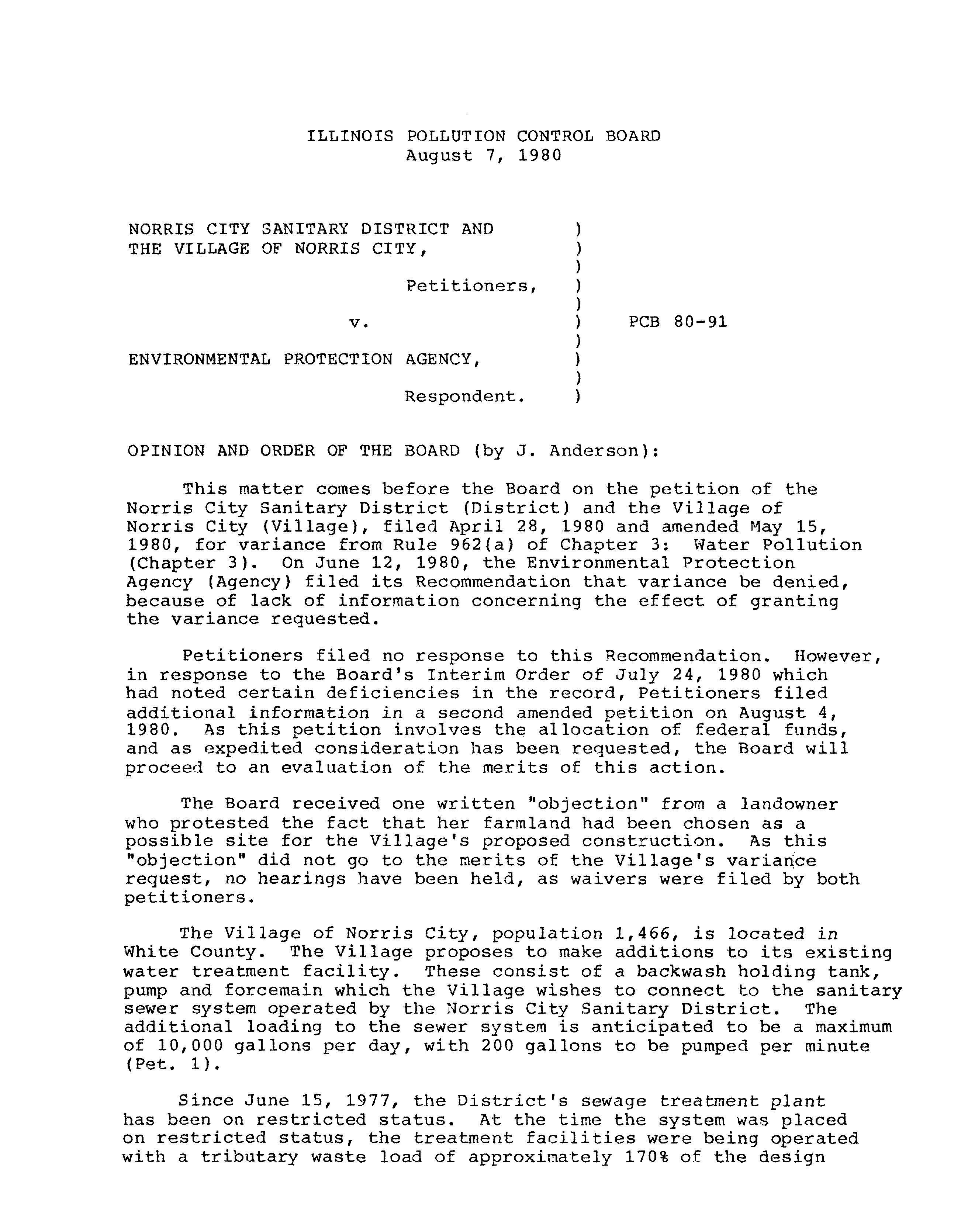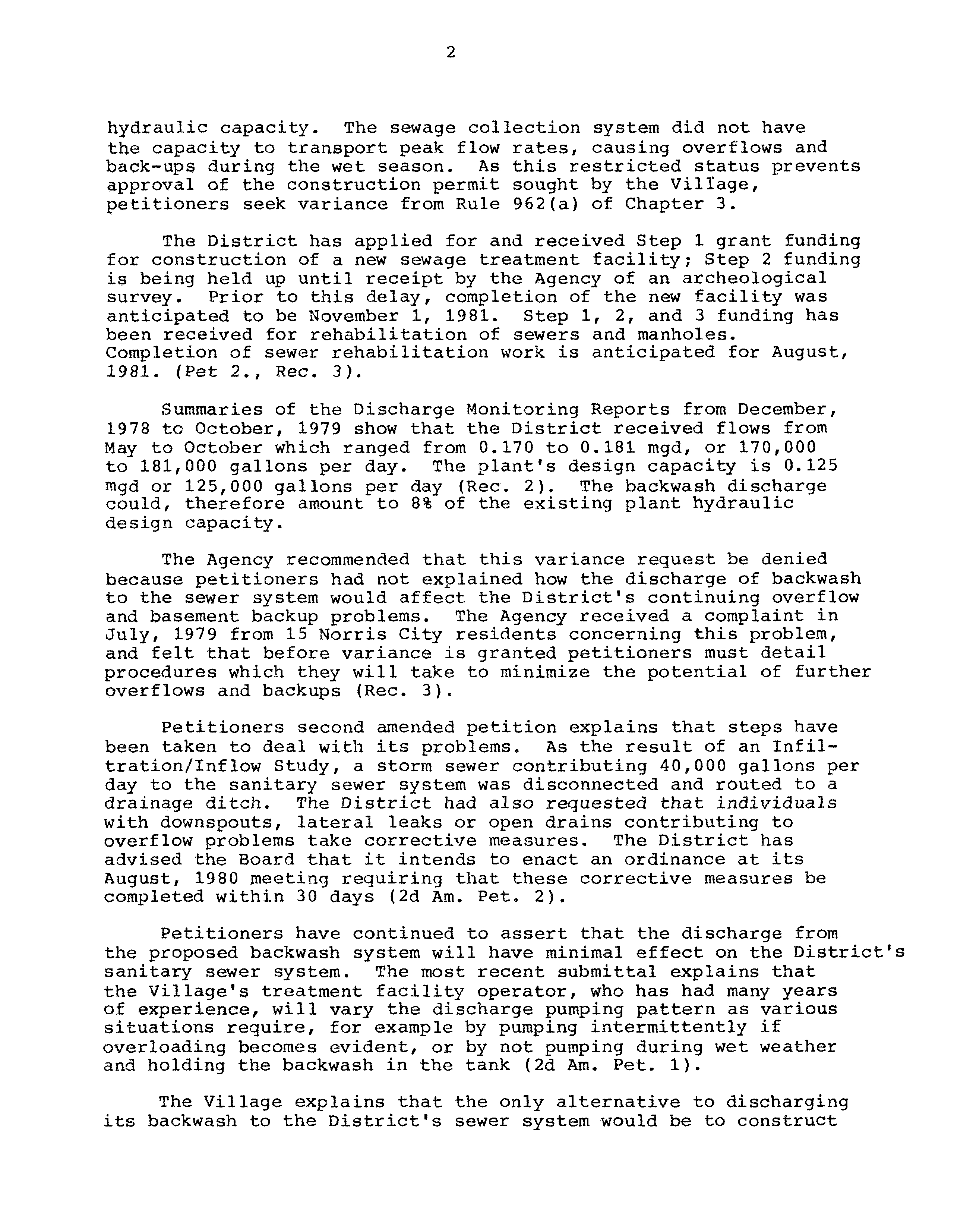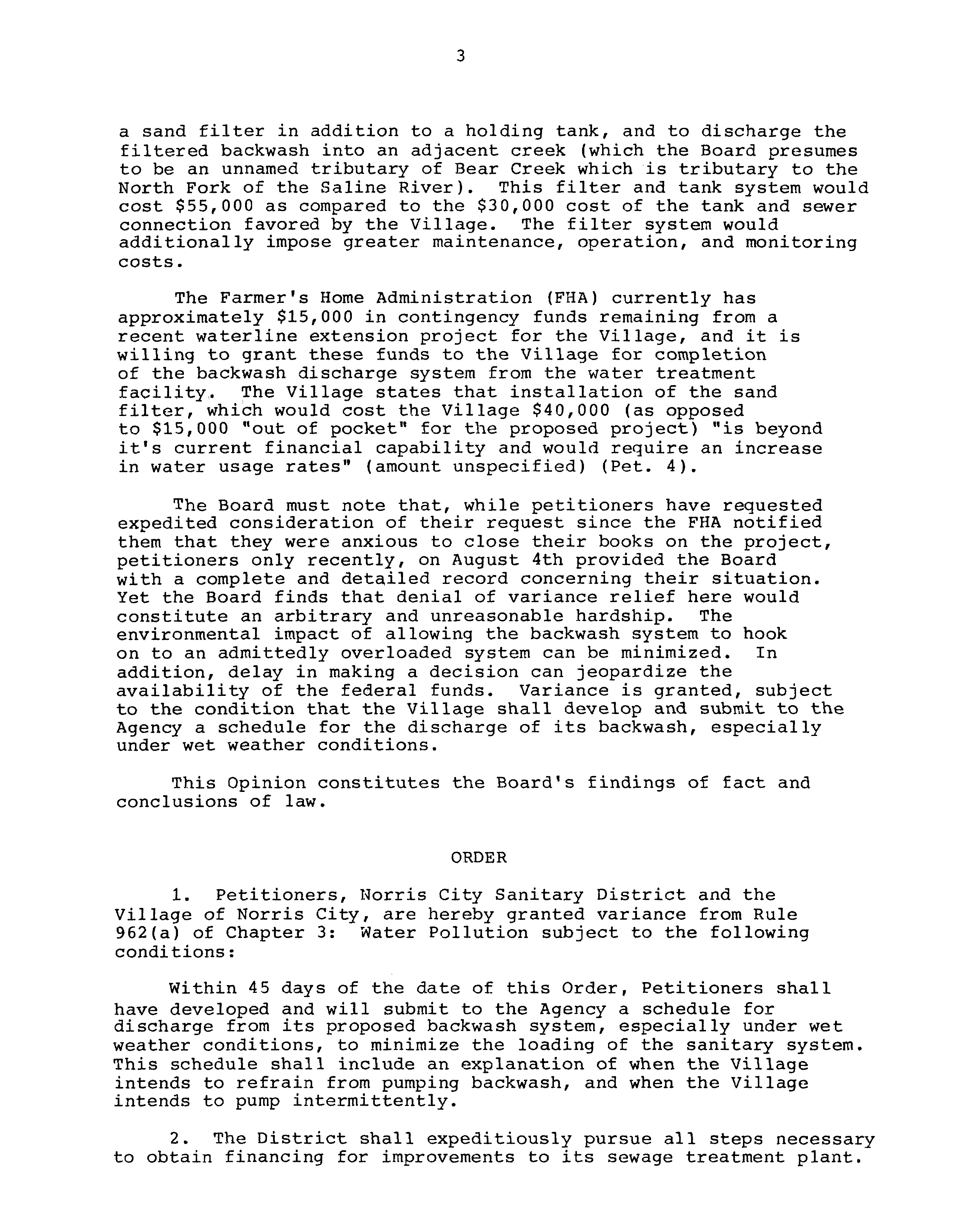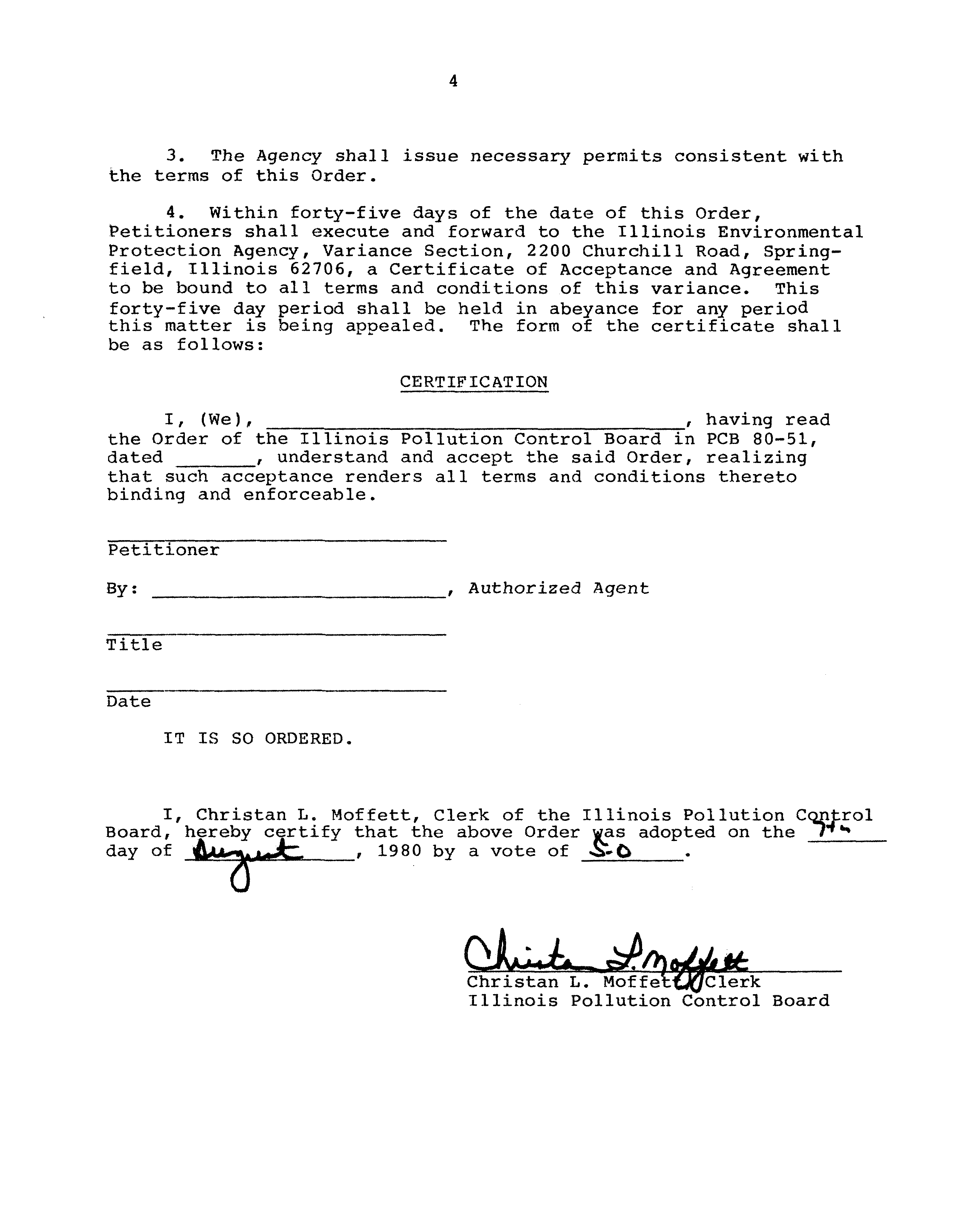ILLINOIS POLLUTION CONTROL BOARD
August 7, 1980
NORRIS CITY SANITARY DISTRICT AND
THE VILLAGE OF NORRIS CITY,
)
Petitioners,
v.
)
PCB 80—91
ENVIRONMENTAL PROTECTION AGENCY,
)
Respondent.
OPINION AND ORDER OF THE BOARD (by J. Anderson):
This matter comes before the Board on the petition of the
Norris City Sanitary District (District) and the Village of
Norris City (Village), filed April 28, 1980 and amended May 15,
1980, for variance from Rule 962(a) of Chapter 3: Water Pollution
(Chapter 3). On June 12, 1980, the Environmental Protection
Agency (Agency) filed its Recommendation that variance be denied,
because of lack of information concerning the effect of granting
the variance requested.
Petitioners filed no response to this Recommendation. However,
in response to the Board’s Interim Order of July 24, 1980 which
had noted certain deficiencies in the record, Petitioners filed
additional information in a second amended petition on August 4,
1980. As this petition involves the allocation of federal funds,
and as expedited consideration has been requested, the Board will
proceed to an evaluation of the merits of this action.
The Board received one written “objection” from a landowner
who protested the fact that her farmland had been chosen as a
possible site for the Village’s proposed construction. As this
“objection” did not go to the merits of the Village’s variance
request, no hearings have been held, as waivers were filed by both
petitioners.
The Village of Norris City, population 1,466, is located in
White County. The Village proposes to make additions to its existing
water treatment facility. These consist of a backwash holding tank,
pump and forcemain which the Village wishes to connect ~o the sanitary
sewer system operated by the Norris City Sanitary District. The
additional loading to the sewer system is anticipated to be a maximum
of 10,000 gallons per day, with 200 gallons to be pumped per minute
(Pet. 1).
Since June 15, 1977, the District’s sewage treatment plant
has been on restricted status. At the time the system was placed
on restricted status, the treatment facilities were being operated
with a tributary waste load of approximately 170 of the design
2
hydraulic capacity. The sewage collection system did not have
the capacity to transport peak flow rates, causing overflows and
back—ups during the wet season. As this restricted status prevents
approval of the construction permit sought by the Village,
petitioners seek variance from Rule 962(a) of Chapter 3.
The District has applied for and received Step 1 grant funding
for construction of a new sewage treatment facility; Step 2 funding
is being held up until receipt by the Agency of an archeological
survey. Prior to this delay, completion of the new facility was
anticipated to be November 1, 1981. Step 1, 2, and 3 funding has
been received for rehabilitation of sewers and manholes.
Completion of sewer rehabilitation work is anticipated for August,
1981.
(Pet 2., Rec. 3).
Summaries of the Discharge Monitoring Reports from December,
1978 to October, 1979 show that the District received flows from
May to October which ranged from 0.170 to 0.181 mgd, or 170,000
to 181,000 gallons per day. The plant’s design capacity is 0.125
mgd or 125,000 gallons per day (Rec. 2). The backwash discharge
could, therefore amount to 8 of the existing plant hydraulic
design capacity.
The Agency recommended that this variance request be denied
because petitioners had not explained how the discharge of backwash
to the sewer system would affect the District’s continuing overflow
and basement backup problems. The Agency received a complaint in
July, 1979 from 15 Norris City residents concerning this problem,
and felt that before variance is granted petitioners must detail
procedures which they will take to minimize the potential of further
overflows and backups (Rec. 3).
Petitioners second amended petition explains that steps have
been taken to deal with its problems. As the result of an Infil-
tration/Inflow Study, a storm sewer contributing 40,000 gallons per
day to the sanitary sewer system was disconnected and routed to a
drainage ditch. The District had also requested that individuals
with downspouts, lateral leaks or open drains contributing to
overflow problems take corrective measures. The District has
advised the Board that it intends to enact an ordinance at its
August, 1980 meeting requiring that these corrective measures be
completed within 30 days (2d Am. Pet. 2),
Petitioners have continued to assert that the discharge from
the proposed backwash system will have minimal effect on the District’s
sanitary sewer system. The most recent submittal explains that
the Village’s treatment facility operator, who has had many years
of experience, will vary the discharge pumping pattern as various
situations require, for example by pumping intermittently if
overloading becomes evident, or by not pumping during wet weather
and holding the backwash in the tank (2d Am. Pet. 1).
The Village explains that the only alternative to discharging
its backwash to the District’s sewer system would be to construct
3
a sand filter in addition to a holding tank, and to discharge the
filtered backwash into an adjacent creek (which the Board presumes
to be an unnamed tributary of Bear Creek which is tributary to the
North Fork of the Saline River). This filter and tank system would
cost $55,000 as compared to the $30,000 cost of the tank and sewer
connection favored by the Village. The filter system would
additionally impose greater maintenance, operation, and monitoring
costs.
The Farmer’s Home Administration (FHA) currently has
approximately $15,000 in contingency funds remaining from a
recent waterline extension project for the Village, and it is
willing to grant these funds to the Village for completion
of the backwash discharge system from the water treatment
facility.. The Village states that installation of the sand
filter, which would cost the Village $40,000 (as opposed
to $15,000 “out of pocket” for the proposed project) “is beyond
it’s current financial capability and would require an increase
in water usage rates” (amount unspecified) (Pet. 4).
The Board must note that, while petitioners have requested
expedited consideration of their request since the FHA notified
them that they were anxious to close their books on the project,
petitioners only recently, on August 4th provided the Board
with a complete and detailed record concerning their situation.
Yet the Board finds that denial of variance relief here would
constitute an arbitrary and unreasonable hardship. The
environmental impact of allowing the backwash system to hook
on to an admittedly overloaded system can be minimized. In
addition, delay in making a decision can jeopardize the
availability of the federal funds. Variance is granted, subject
to the condition that the Village shall develop and submit to the
Agency a schedule for the discharge of its backwash, especially
under wet weather conditions.
This Opinion constitutes the Board’s findings of fact and
conclusions of law.
ORDER
1. Petitioners, Norris City Sanitary District and the
Village of Norris City, are hereby granted variance from Rule
962(a) of Chapter 3: Water Pollution subject to the following
conditions:
Within 45 days of the date of this Order, Petitioners shall
have developed and will submit to the Agency a schedule for
discharge from its proposed backwash system, especially under wet
weather conditions, to minimize the loading of the sanitary system.
This schedule shall include an explanation of when the Village
intends to refrain from pumping backwash, and when the Village
intends to pump intermittently.
2. The District shall expeditiously pursue all steps necessary
to obtain financing for improvements to its sewage treatment plant.
4
3. The Agency shall issue necessary permits consistent with
the terms of this Order.
4. Within forty—five days of the date of this Order,
Petitioners shall execute and forward to the Illinois Environmental
Protection Agency, Variance Section, 2200 Churchill Road, Spring-
field, Illinois 62706, a Certificate of Acceptance and Agreement
to be bound to all terms and conditions of this variance. This
forty-five day period shall be held in abeyance for any period
this matter is being appealed. The form of the certificate shall
be as follows:
CERTIFICATION
I, (We),
,
having read
the Order of the Illinois Pollution Control Board in PCB 80—51,
dated
_______,
understand and accept the said Order, realizing
that such acceptance renders all terms and conditions thereto
binding and enforceable.
Petitioner
By:
Title
Authorized Agent
Date
IT IS SO ORDERED.
I, Christan L. Moffett, Clerk of the Illinois Pollution Cojijrol
Board, hereby certify that the above Order ~as adopted on the
I’~
day of
~
,
1980 by a vote of
S.~
Christan L. Moffe tljClerk
Illinois Pollution Control Board
a




